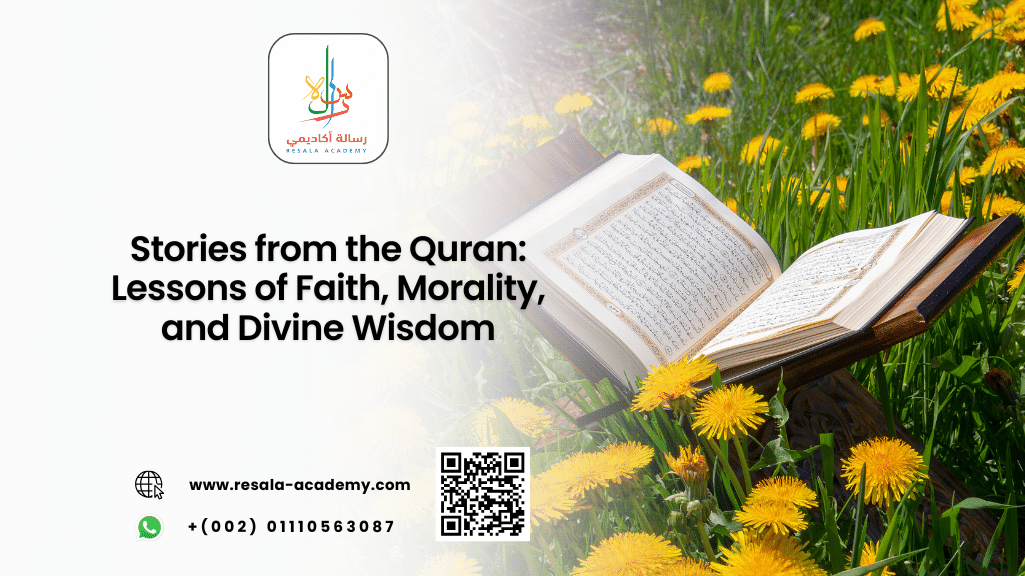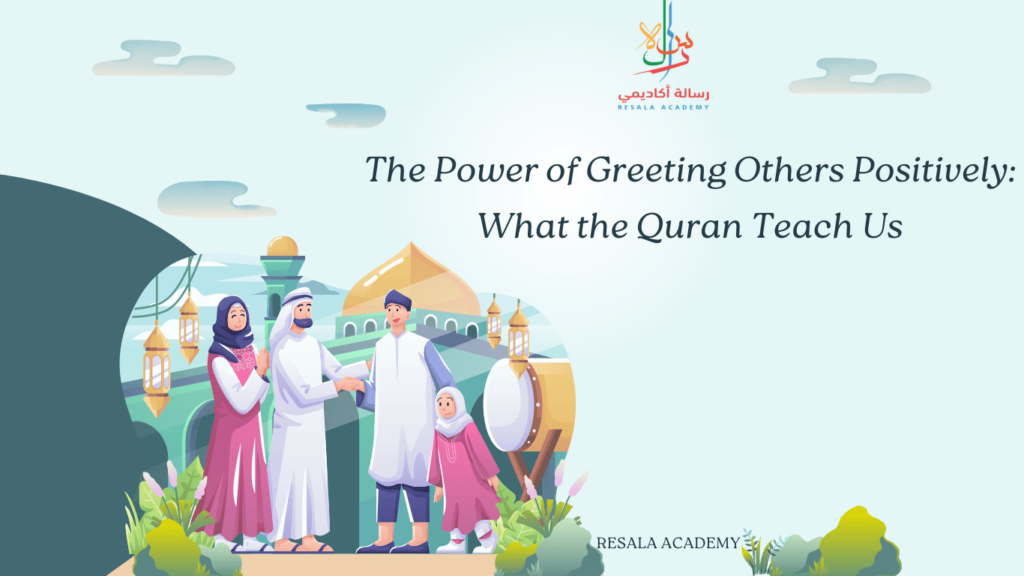Table of Contents
Stories from the Quran: Lessons of Faith, Morality, and Divine Wisdom
The Quran is not just a book of divine commandments; it is also a treasure trove of timeless stories that illuminate the path of righteousness, patience, and unwavering faith.
These stories, known as stories from the Quran, are not mere narratives but divine lessons that transcend time and culture. They serve as moral compasses, spiritual awakenings, and historical insights for Muslims and non-Muslims alike.
In this article, we delve into some of the most powerful and transformative stories from the Quran, exploring their meanings, lessons, and relevance in today’s world.
Whether you’re a devout Muslim or a curious learner, these stories will inspire and guide you. And if you’re looking to deepen your understanding of the Quran and Arabic language, Resala Academy is your trusted companion on this spiritual journey.
Why Are Stories from the Quran Important?
The Quran employs storytelling as a divine tool to:
- Teach moral and ethical values
- Strengthen faith and patience
- Warn against arrogance and injustice
- Offer historical context and spiritual depth
- Guide believers through real-life examples
Allah says in the Quran:
نَحْنُ نَقُصُّ عَلَيْكَ أَحْسَنَ الْقَصَصِ
“We relate to you, [O Muhammad], the best of stories.”
(Surah Yusuf, 12:3)
Read more here
These stories are not fictional tales but divinely revealed truths meant to guide humanity.
Key Stories from the Quran and Their Lessons
1. The Story of Prophet Yusuf (Joseph): Patience and Trust in Allah
One of the most detailed and emotionally moving stories in the Quran is that of Prophet Yusuf (عليه السلام). Betrayed by his brothers, sold into slavery, and imprisoned unjustly, Yusuf’s life is a testament to patience, resilience, and unwavering faith.
وَاللَّهُ غَالِبٌ عَلَىٰ أَمْرِهِ
“But Allah is predominant over His affair.”
(Surah Yusuf, 12:21)
Explore Surah Yusuf
Lessons:
- Patience in adversity leads to divine reward.
- Trust in Allah’s plan even when it seems difficult.
- Forgiveness is a noble virtue.
2. The Story of Prophet Musa (Moses): Courage and Leadership
The story of Prophet Musa (عليه السلام) is one of confrontation between truth and tyranny. From his miraculous survival as an infant to his confrontation with Pharaoh, Musa’s journey is filled with divine signs and lessons in courage.
إِنَّ مَعِيَ رَبِّي سَيَهْدِينِ
“Indeed, with me is my Lord; He will guide me.”
(Surah Ash-Shu’ara, 26:62)
Read Surah Ash-Shu’ara
Lessons:
- Stand firm in the face of oppression.
- Leadership requires faith and humility.
- Miracles happen when you trust Allah.
3. The Story of Prophet Nuh (Noah): Perseverance in Dawah
Prophet Nuh (عليه السلام) preached for 950 years, yet only a few believed in him. His unwavering dedication to spreading the message of monotheism is a lesson in perseverance.
إِنِّي دَعَوْتُ قَوْمِي لَيْلًا وَنَهَارًا
“Indeed, I invited my people [to truth] night and day.”
(Surah Nuh, 71:5)
Read Surah Nuh
Lessons:
- Never give up on your mission.
- Success lies in effort, not results.
- True believers are often few in number.
4. The Story of Maryam (Mary): Purity and Devotion
Maryam (عليها السلام) is the only woman mentioned by name in the Quran and is revered for her chastity and devotion. Her story is a symbol of divine favor and spiritual strength.
وَإِذْ قَالَتِ ٱلْمَلَـٰٓئِكَةُ يَـٰمَرْيَمُ إِنَّ ٱللَّهَ ٱصْطَفَىٰكِ وَطَهَّرَكِ وَٱصْطَفَىٰكِ عَلَىٰ نِسَآءِ ٱلْعَـٰلَمِينَ
“And ˹remember˺ when the angels said, “O Mary! Surely Allah has selected you, purified you, and chosen you over all women of the world.”
(Surah Aal-Imran, 3:42)
Read Surah Aal-Imran
Lessons:
- Purity and devotion are honored by Allah.
- Miracles are signs of divine mercy.
- Women hold a revered place in Islam.
5. The Story of Prophet Ibrahim (Abraham): Sacrifice and Tawheed
Prophet Ibrahim (عليه السلام) is known as the father of monotheism. His willingness to sacrifice his son for Allah’s sake is one of the most profound acts of submission.
قَالَ إِنِّي أَرَىٰ فِي الْمَنَامِ أَنِّي أَذْبَحُكَ
_”He said, ‘O my son, indeed I have seen in a dream that I [must] sacrifice you.'”
(Surah As-Saffat, 37:102)
Read Surah As-Saffat
Lessons:
- True faith requires sacrifice.
- Dreams can be divine guidance.
- Tawheed (monotheism) is the foundation of Islam.
Why Stories from the Quran Are Essential for Spiritual and Academic Growth
Foundational for Islamic Education:
The stories from the Quran serve as the cornerstone for understanding Islamic principles, offering real-life examples of divine justice, mercy, and wisdom. These narratives help learners internalize complex theological concepts through relatable human experiences.
Enhances Quranic Vocabulary and Contextual Understanding:
Studying these sacred accounts allows students to grasp Quranic Arabic in a contextualized manner. This is especially beneficial for non-native speakers aiming to comprehend the Quran beyond translation, as each story introduces key terms, verbs, and expressions used across multiple surahs.
Bridges Cultural and Linguistic Gaps:
For learners from diverse backgrounds, the Quranic stories provide a universal language of morality and spirituality. They connect individuals to the Islamic tradition while simultaneously improving their Arabic fluency and comprehension.
Facilitates Reflective Tafsir (Interpretation):
These stories are often accompanied by divine commentary, making them ideal for practicing tafsir. Learners can reflect on divine wisdom and apply it to contemporary life situations, enhancing both their spiritual and intellectual engagement with the Quran.
Deepen Your Quranic Journey Through the Timeless Stories of Revelation
Chronological and Thematic Learning:
Exploring the stories from the Quran in a structured manner—whether chronologically or thematically—enables students to see the progression of divine messages and the consistency of moral themes such as justice, patience, and faith.
Ideal for All Learning Levels:
Whether you’re a beginner or an advanced student, the Quranic parables offer layered meanings. Beginners can appreciate the surface-level morals, while advanced learners can delve into linguistic nuances, historical contexts, and jurisprudential implications.
Supports Memorization and Retention:
The storytelling format of the Quran aids in memorization. Associating verses with specific events or characters makes it easier for students to retain and recall Quranic passages during prayer or study.
Inspires Personal Transformation:
Each of the stories from the Quran is designed to transform the reader’s heart and mind. From the perseverance of Prophet Nuh to the sincerity of Maryam, these stories offer timeless guidance for personal growth and spiritual resilience.
Ready to explore these divine stories in depth? Join Resala Academy and begin your journey through the Quran today.
How Stories from the Quran Benefit Non-Native Arabic Speakers
For non-native speakers, understanding the Quran can be challenging. However, the stories from the Quran offer a gateway to grasp the essence of Islamic teachings in a relatable and engaging manner. These stories:
- Simplify complex theological concepts
- Enhance vocabulary and comprehension
- Provide cultural and historical context
- Deepen spiritual connection
Read more about our article: “Study Quran Arabic: Unlocking the Language of Divine Revelation.” Discover how Resala Academy plays a pivotal role in your Quranic Arabic journey.
Discover the Quran Like Never Before with Resala Academy
At Resala Academy, we believe that every learner deserves access to authentic Islamic education. Our expert instructors specialize in teaching Arabic and Quran to non-native speakers through:
- Interactive live classes
- Certified Quran teachers
- Personalized learning plans
- Flexible schedules
- One-on-one and group sessions
Whether you’re a beginner or an advanced learner, our courses are designed to help you understand the Quran deeply—starting with its most powerful tool: its stories.
Join Resala Academy today and transform your Quranic journey into a life-changing experience.
Frequently Asked Questions (FAQs)
1. What are the main purposes of stories in the Quran?
The stories in the Quran aim to teach moral values, strengthen faith, and provide historical context. They serve as divine lessons for all generations.
2. Are the stories in the Quran historically accurate?
Yes, the Quranic stories are considered divinely revealed truths. Many of them align with historical and archaeological findings and are confirmed by Hadith literature.
3. Can non-Muslims benefit from reading Quranic stories?
Absolutely. The stories from the Quran offer universal lessons in ethics, patience, and justice that resonate with people of all faiths.
4. How can I learn more about these stories in Arabic?
You can enroll in specialized Arabic and Quran courses at Resala Academy, which are tailored for non-native speakers and focus on understanding the Quran in its original language.
5. What is the best way to memorize and understand Quranic stories?
- Start with short surahs and stories.
- Use audio recitations and translations.
- Join online classes like those at Resala Academy.
- Reflect on the meanings and lessons.
Conclusion
The stories from the Quran are more than just historical accounts—they are divine messages that continue to guide, inspire, and transform lives. From the patience of Yusuf to the courage of Musa, each story is a beacon of light for those seeking truth and wisdom.
If you’re ready to explore these stories in their original Arabic and unlock the deeper meanings of the Quran, Resala Academy is here to guide you every step of the way.
Let the stories of the Quran shape your story. Start your journey with Resala Academy today.
Visit Resala Academy




